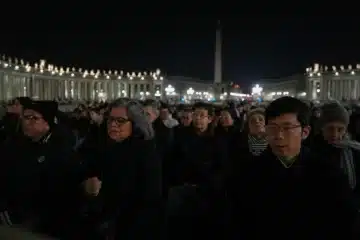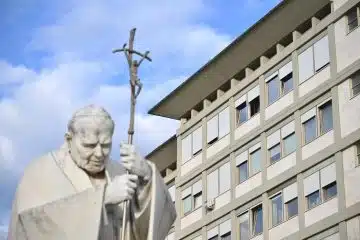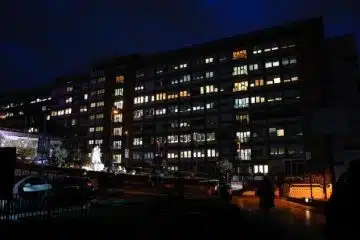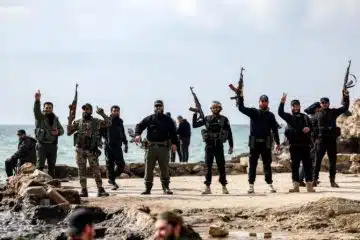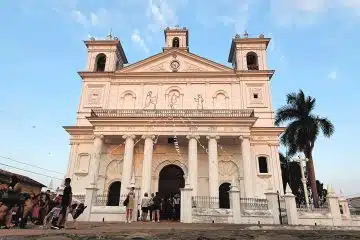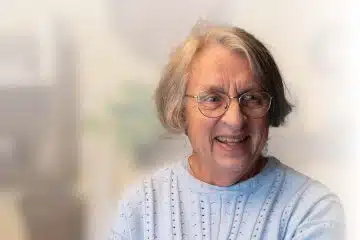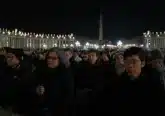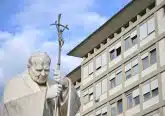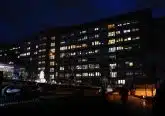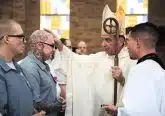Archbishop Dennis M. Schnurr holds press conference on new pope
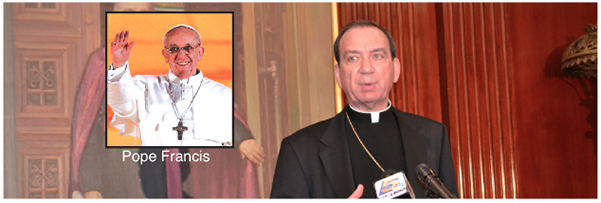
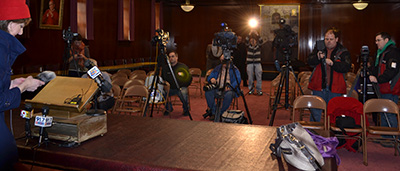
By John Stegeman
The Catholic Telegraph
After watching the introduction of Pope Francis to the world Wednesday, Archbishop Dennis M. Schnurr hosted a press conference at the Synod Hall at the Cathedral of St. Peter in Chains. Many of the media outlets in the greater Cincinnati area were present to get Archbishop Schnurr’s reaction to the election of the first pope from the Americas — Cardinal Jorge Bergoglio, a Jesuit from Argentina.
Also Read:
Habemus Papam Central
Below are a selection of questions asked and the archbishop’s answers from the press conference.
Do you know the new pope personally?
“I do not. Like you I am going to spend the next few days trying to learn more about the new pope.”
How important is it for the Church moving forward that this pope is from Latin America?
“Latin America and Africa are the two fastest growing Catholic populations in the world. As you know, right from the get go there was speculation that the cardinals would be looking either to Africa or Latin America but I think its also a very important decision for the hispanic communities wherever they may be found. I rejoice with the Hispanic communities in this archdiocese and this country. I’m sure they’re elated with the election of one of their own.”
What was your reaction when you heard the pope had been elected?
“I was in my office doing my daily work. The thing that kind of disturbed me was when the bells of St. Louis Church started ringing a little after 2 p.m. It dawned on me that the pope must have been elected. I was surprised.
“When I was asked about when I thought a new pope would be elected, I said I thought it would go into the third day of voting. But on the second day, we have a pope.”
How do you think his being a Jesuit will color his leadership?
“He is very highly regarded and he comes from a very scholastic background. The cardinal electors don’t look at whether someone is a diocesan priest or if someone is a member of a religious order. They vote for the individual that they think is most needed by the Church today. Once again, the voting is under the guidance of the Holy Spirit.
“I’m sure the Jesuit community is elated, and I rejoice with them.”
What changes from the new pope would you like to see?
“I think the important thing in the Church if we’re talking about the teachings of the Church is continuity. The teachings of the Church as we have them were given to us by Christ. It is the primary role of the Holy Father to make certain that those teachings are maintained and taught faithfully.
“The Church is both human and divine. We can’t touch that which is divine. On the human side, when it comes to governance and what people are going to be in place, that can all change. Many times we hear, for example, that we wish the Holy See could be more transparent in some discussions. That’s one of those areas where certainly its possible, except for such things as the conclave…”
Does Pope Francis’ age of 76 concern you?
“Again we’re going back to Pope John Paul II who was only 58. Cardinal Ratzinger when he was elected was 78. Cardinal (Jorge) Bergoglio is right there with Pope Benedict. I think that’s probably a concern of a good number of people as far as his energy level. I don’t know what his medical history has been but people at 76 years of age can be very energetic and have many years of good service ahead of them.
“Personally, I was expecting someone a little younger, yes.”
What does the election of the first non-European pope say to the world?
“I think its saying that the cardinals recognize the fact that the Catholic Church is a universal church and we should be looking beyond Europe to other parts of the world.”
What are your personal reflections on his choice of the name Francis?
(Editor’s note: Archbishop Schnurr was responding to the question before it was definitively known that Pope Francis chose the name for St. Francis of Assisi.)
“He is a Jesuit, so it might be St. Francis Xavier. The Church is talking in a very significant way about the New Evangelization. St. Francis Xavier certainly was a witness to evangelization. Others thought it was St. Francis of Assisi and that just indicates that he is very humble in his approach to things.
“I heard it said he lives in a small apartment in Argentina, that he uses public transportation quite a bit. Maybe it is a hybrid between the two, St. Francis of Assisi and St. Francis Xavier.”
What did the enthusiasm and energy of the crowd and young people gathered in St. Peter’s Square say about the state of the Church?
“We have our challenges. I’m glad you brought up young people in particular. As I go around this archdiocese, I’m amazed at the enthusiasm of young people for the faith…
“Pope John Paul II put in place World Youth Day. That has stimulated a real enthusiasm for the faith and a real interest in the papacy because the young people had such a close relationship with Pope John Paul II and with Pope Benedict XVI.
“I think because they were recognized because Pope John Paul II and Pope Benedict, I think they were there in large numbers because they wanted to see who the pope is and is he an individual that they can see truly as their Holy Father and someone who is going to recognize the importance of young people in the Church today.
“In 1993 I put together the program for World Youth Day in Denver. For two years leading up to that I had an opportunity to work rather closely with John Paul II. From John Paul II I learned, he would always say, ‘We do not talk about young people as the Church of the future, they are important to us today.’ I think that’s why young people are very interested in the papacy.”
What is your reflection on Pope Francis’ first remarks?
“He came across to me as an individual who was overwhelmed by the election, but someone also who is very humble. He wanted the people to know he needed their prayers, and that he was praying for them.
“He was reaching out to them. This is the most important thing that we can do for one another is to pray for one another. I think it was a very humble gesture on his part. I heard one commentator say that he was very inclusive, and I didn’t quite know what they meant by that originally. What they meant was that, with the crowd, he recited the Our Father, the Hail Mary, and the Glory Be. By inclusive, they meant that those are prayers that every Catholic no matter what their age, and even lapsed Catholics, know those prayers. The Our Father is known to non-Catholics as well. He wants to reach out to everyone.”


